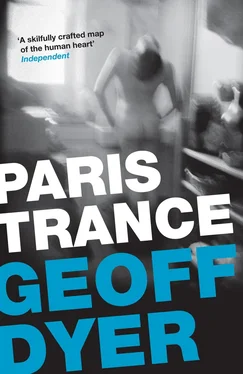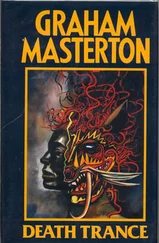The miles slipped by. They fell silent. To no one in particular Alex, who had taken over the driving, said,
‘Has anyone ever said to you: “cat’s eyes — what a great invention!”?’ There was no answer. He glanced over at Luke who was sleeping in the seat next to him. In the back seat the women were also asleep, exactly as they had been during the winter trip. Smiling, Alex concentrated on the road ahead.
It got light so early it seemed the darkness had not really slept, only taken a nap. The light was bleary-eyed, uncertain, then it began to brighten. The sun stumbled over the hills in the distance. Already, when they passed through villages, people were up and working. At the first patisserie they saw Luke got out and bought coffee and disappointing croissants. They ate in the car, as if they were on a stake-out, ‘even though it’s really only a take-out’.
‘Very funny Luke,’ said Alex, his eyes sore with tiredness. They wanted to toss their Styrofoam cups out of the window but were worried about littering. Luke took them over to the bin and Sahra took over the driving.
A road drifted up to the house, winding not so much to negotiate the slight gradient as for the visual pleasure afforded by doing so. The house itself was perched on the edge of a field of wheat. It was a low, sprawling place with a roof that sloped almost to the ground. The walls were thick, made of clumps of what was, presumably, some native stone, sand-coloured. This was the architecture of bitter winters and blazing summers. The front door scraped over the tiled floor as they pushed it open. They opened the shutters. White light rushed in, filling every angle of the interior.
Most of the structural work had been completed. The floors required varnishing, the bathroom had to be tiled, everything needed painting. The whole place needed cleaning. There was dust everywhere, it was a mess, but, essentially, Alex declared, the problems were cosmetic. There was gas but no cooker as yet (though they had instructions from Lazare about which model he wanted, and money to pay for it) and there was almost no furniture: a few fold-up chairs, a table, two thin mattresses, some loungers for outside.
Nicole heard Luke calling her. She went out and saw him standing by the car. Spunk was perched on its warm bonnet, full of life again, tail wagging.
The village was three kilometres away but apart from a bar and butcher there was almost nothing there. The town was another twenty-five kilometres beyond that. On their first trip there they bought the cooker Lazare had requested and ate lunch at Chez Marianne, a restaurant run by an old couple who took a liking to them. On a napkin they sketched a time-table: Monday to Friday, in the mornings (start-time optional), they would work without fail (at what was not made clear). Afternoons and weekends were optional.
After agreeing these terms they took a stroll round the town. It was a nice place with a river and church and a market on Wednesdays. They drove there every Wednesday and sometimes on Saturdays, to stock up on supplies, to phone Lazare to let him know how things were progressing, and to eat lunch at the restaurant. Strictly speaking these Wednesday-morning outings contravened the time-table but the purpose of scheduling their time like this — Luke argued — was not so much to ensure that the work was done as to make the pleasure of not working as intense as possible. Uninterrupted idleness would have turned quickly to boredom. As it was, the obligation to work each day for four hours or so meant that their free time maintained its idyllic, valued quality.
The problem with the work was that Alex was the only one who knew how to do most of it. Luke, Sahra and Nicole could paint and tidy up but only Alex was capable of performing more advanced functions. Luke liked the idea of putting up shelves but Alex had to do the sawing himself if any vestige of accuracy was to be maintained. While capable of planning lavish and complex changes to the basic layout of the house Nicole had relatively little experience of actually putting these plans into practice. She was adaptable, versatile, learned quickly and in the chain of command she became Alex’s second-in-command. (Alex had appointed himself ‘supreme commander’ without opposition but Luke advised him not to get too excited about being Nicole’s boss: the last one, he pointed out, had almost been stabbed in the face for his pains.) Sahra had the invaluable skill of being a meticulous finisher. Luke, it became apparent, was hopeless even at measuring and his task, consequently, was to sort out and clean the barn which was crammed to the rafters with useful and useless stuff accumulated over a period of more than five years. It was an immense, filthy job and he complained about it on a daily basis.
‘That’s the price you pay for being totally unskilled,’ said Alex. ‘Sweat is cheap. Were you capable of performing a more complex, rewarding task, we would consider assigning it to you. As it is, you’re not. Hence. .’
‘the barn!’ shouted Sahra and Nicole together.
While working on the house the other three became used to hearing cursing and swearing as Luke dragged another load of dusty rubble or rust-encrusted implements into the yard. Often these yells were violent enough to make them think that he had injured himself. One day, though, a wild shriek emerged from the barn, followed by the call to ‘come quickly’. They dashed out, expecting to find him pinned beneath a ton of farm equipment, only to find him struggling with—
‘A Ping-Pong table!’ Alex was as excited as Luke and together they dragged it out into the sunlight. It was warped slightly on one side, a chunk appeared to have been bitten out of a corner, a leg was missing: these things aside, it was easily ‘of championship standard’. The net, when they found it, was ragged but Nicole managed to tie string across the rips. They set up the table in a sheltered spot by the side of the house, using bricks to prop up the sagging, legless corner.
‘There is one small problem,’ said Alex. ‘We haven’t got bats or balls.’
‘Shit!’
They bought them the next time they went into town and began playing as soon as they got back. It was years since anyone had played and at first they tapped the ball back and forth mechanically, rarely deviating from the safety of the backhand. Spin was introduced gradually. Then, occasionally, one of them would finish the rally with an aggressive forehand, either winning the point (very rarely) or (more usually) whacking the ball into the net. After a few days the success rate for forehands went up — but so too did the frequency with which these shots were returned. From there it was a small step to returning an attacking forehand with an attacking forehand of still greater ferocity. Instead of simply taking it in turns to play, Luke and Alex forced through the principle of Winner Stays On. Nicole dropped quickly out of the rankings and tended not to play. Sahra, who claimed to have played for her school team, won some games but the table came to be dominated, predictably, by Luke and Alex. Alex attacked relentlessly but Luke, relying on twisting combinations of spin — the Ping-Pong equivalent of judo — began to use his opponent’s strength against him. Standing way back from the table he kept looping the ball back until Alex finally over-hit or slammed it into the net and lost the point.
For a while Ping-Pong dominated their lives. Then it was sidelined by a more important discovery. On most days one or all of the party went out ‘on reconnaissance’ (as Luke and Alex termed it), ‘for a bike ride’ (as Nicole and Sahra termed it). They were all out together, about two miles from home, when they came across an old clay tennis court. It was at the edge of a field and seemed to belong to no one. Luke and Alex tore home, snatched up their rackets, cycled back and launched immediately into what turned out to be a gruelling four-setter (won by Alex) in ninety-degree heat. The women returned from their ride to find both men cowering in the shade, dehydrated, on the brink of heat-stroke.
Читать дальше












